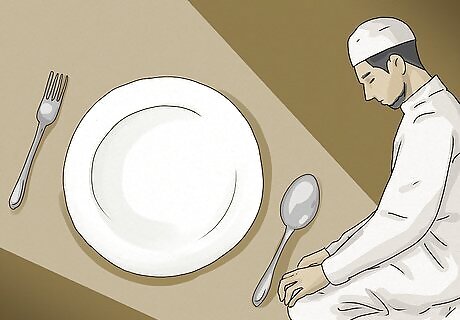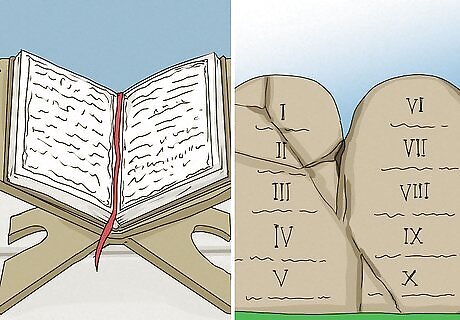
views
- The Qur’an doesn’t include the Ten Commandments like the New and Old Testament do—however, it does have similar moral rules.
- The Qur’an states that there is only one god, idols are not authorized by Allah (God), and to keep away from those who misuse Allah’s name.
- It also says to not kill except under the law, commit adultery, or steal another’s wealth or property.
10 Important Rules of Islam

There is only one God. Muslims believe that there’s only one god and He is all-powerful and all-knowing. Allah has no children, race, gender, or body. Muslims also believe that God has angels that carry out His orders throughout the universe. “Your God is only One God. There is no god worthy of worship except Him—the Most Compassionate, Most Merciful.” (Surah al-Baqarah 2:163) “All praise is for Allah, the Originator of the heavens and the earth, Who made angels as His messengers with wings—two, three, or four. He increases in creation whatever He wills. Surely Allah is Most Capable of everything.” (Surah Fatiha 35:1)

Believe in the Day of Judgement. Muslims believe that nothing happens without God’s knowledge and that humans have free will, or the freedom to choose good or evil. They also believe that there will be a Day of Judgement, when Allah will weigh humans’ sins against their good deeds and decide if they’re sent to heaven or hell. “He will gather you all for the Day of Gathering…whoever believes in Allah and does good, He will absolve them of their sins and admit them into Gardens under which rivers flow, to stay there for ever and ever.” (Surah At-Taghabun 64:9) “As for those who disbelieve and reject Our revelations, they will be the residents of the Fire, staying there forever. What an evil destination!” (Surah At-Taghabun 64:10)

Worship the texts of God and believe in His prophets. Muslims believe that God revealed holy books and scriptures to His messengers, including Muhammed (the Qur’an), Moses (the Torah), Jesus (the Gospel), David (the Psalms), and Abraham (the scrolls). However, out of all these texts, only the Qur’an remains as it was first revealed to the prophet Muhammed. “Muḥammad is not the father of any of your men, but is the Messenger of Allah and the seal of the prophets. And Allah has perfect knowledge of all things.” (Surah Al-Ahzab 33:40) “As for those who believe, do good, and have faith in what has been revealed to Muḥammad—which is the truth from their Lord—He will absolve them of their sins and improve their condition.” (Surah Muhammad 47:2)

Pray 5 times a day and join congressional prayer on Friday. As part of the Five Pillars, or core beliefs, of Islam, Muslims pray facing Mecca 5 times a day: at dawn, noon, mid-afternoon, sunset, and after dark. Instead of observing the Sabbath, Muslims gather midday on Friday for congregational prayer. “O believers! When the call to prayer is made on Friday, then proceed diligently to the remembrance of Allah and leave off your business. That is best for you, if only you knew.” (Surah al-Jumu’ah 62:9) “Establish prayer O Prophet at both ends of the day and in the early part of the night. Surely good deeds wipe out evil deeds. That is a reminder for the mindful.” (Surah Hud 11:114) “So glorify Allah in the evening and in the morning—all praise is for Him in the heavens and the earth—as well as in the afternoon, and at noon.” (Surah Ar-Rum 10:17-18)

Give charity to the poor and needy. Like in the Ten Commandments, stealing is a sin in Islam. Instead, Muslims are required to regularly give charity (known as zakat or alms), which is based on 2.5% of their income and wealth. In addition, Muslims are encouraged to give as much as they can to the poor and needy throughout the year. “Establish prayer, pay alms-tax, and bow down with those who bow down.” (Surah al-Baqarah 2:43) “They ask you O Prophet in what way they should donate. Say, ‘Whatever donations you give are for parents, relatives, orphans, the poor, and needy travellers. Whatever good you do is certainly well known to Allah.’” (Surah al-Baqarah 2:215)

Fast during Ramadan. This Islamic holiday falls on the 9th month of the Muslim calendar when the Holy Qur’an was sent down from heaven. During Ramadan, Muslims are not allowed to eat or drink from sunrise to sunset. Fasting is an important act of worship, a reminder of spiritual discipline, and a way to empathize with less fortunate people. “Ramaḍân is the month in which the Quran was revealed as a guide for humanity with clear proofs of guidance and the decisive authority. So whoever is present this month, let them fast.” (Surah al-Baqarah 2:185)

Make a pilgrimage to Mecca at least once. As part of the Five Pillars, every adult Muslim who is physically and financially able has to take a pilgrimage, or journey, to the holy city of Mecca at least once in their lifetime. “Call all people to the pilgrimage. They will come to you on foot and on every lean camel from every distant path, so they may obtain the benefits in store for them, and pronounce the Name of Allah on appointed days over the sacrificial animals He has provided for them.” (Surah al-Hajj 22:26-27)

Do not murder unjustly. Islam favors peace over violence—killing the innocent is a sin and Muslims must only wage war according to Allah’s principles of justice. However, the death penalty can be given to those who commit severe crimes like murder, treason, terrorism, or adultery. “That is why We ordained for the Children of Israel that whoever takes a life—unless as a punishment for murder or mischief in the land—it will be as if they killed all of humanity.” (Surah Al-Ma’idah 5:32) “Fight in the cause of Allah only against those who wage war against you, but do not exceed the limits. Allah does not like transgressors.”

Do not indulge in anything harmful. In Islam, anything considered harmful to yourself or society is prohibited. Muslims are not allowed to lie, cheat, bribe, engage in sex outside of marriage, or oppress or abuse others. They also cannot consume pork and must eat meat that’s been butchered and blessed in the Islamic way (halal). “Do not fabricate a lie against Allah, or He will wipe you out with a torment. Whoever fabricates lies is bound to fail.” (Surah Taha 20:61) “Do not go near adultery. It is truly a shameful deed and an evil way.” (Surah Al-Isra 17:32) “Forbidden to you are carrion, blood, and swine; what is slaughtered in the name of any other than Allah; what is killed by strangling, beating, a fall, or by being gored to death; what is partly eaten by a predator unless you slaughter it; and what is sacrificed on altars.” (Surah Al-Ma’idah 5:3)

Honor your family, especially your parents. In Islam, the family is the cornerstone of a healthy and balanced society. Respecting and honoring your parents is important to the Muslim family dynamic because it provides an example for your children to be righteous and dutiful to you and their faith. “Honor your parents. If one or both of them reach old age in your care, never say to them even ‘ugh,’ nor yell at them. Rather, address them respectfully.” (Surah al-Isra 17:23)
Other Rules in Islam

The Qur’an also has rules not covered in the Ten Commandments. A few of these rules and good manners tell Muslims to: Shun the words of falsehood. (Surah al-Hajj 22:30) Avoid many suspicions…And do not spy, nor backbite one another. (Surah al-Hujurat 49:12) Do not be prideful! Surely Allah does not like the prideful. (Surah al-Qasas 28:76) Do not defame one another, nor call each other by offensive nicknames. (Surah al-Hujurat 49:11) Give to close relatives their due, as well as the poor and needy travellers. And do not spend wastefully. (Surah al-Isra 17:26) Be mindful of your oaths. (Surah al-Ma’idah 5:89) They are those who donate in prosperity and adversity, control their anger, and pardon others. And Allah loves the good-doers. (Surah Ali ‘Imran 3:134) When you passed it [gossip] from one tongue to the other, and said with your mouths what you had no knowledge of, taking it lightly while it is extremely serious in the sight of Allah. (Surah An-Nur 24:15) Those who abuse believing men and women unjustifiably… will definitely bear the guilt of slander and blatant sin. (Surah Al-Ahzab 33:58) The true servants of the Most Compassionate are those who walk on the earth humbly, and when the foolish address them improperly, they only respond with peace. (Surah al-Furqan 25:63) Good and evil cannot be equal. Respond to evil with what is best, then the one you are in a feud with will be like a close friend. (Surah Fussilat 41:34) O believers! Do not insult [others’ false gods] or they will insult Allah spitefully out of ignorance. (Surah al-An’am 6:108) And if two groups of believers fight each other, then make peace between them. (Surah al-Hujurat 49:9) Be moderate in your pace. And lower your voice, for the ugliest of all voices is certainly the braying of donkeys. (Surah Luqman 31:19) O believers! Do not enter any house other than your own until you have asked for permission and greeted its occupants. (Surah An-Nur 24:27) When you divorce women… either retain them honourably or let them go honourably. But do not retain them only to harm them or to take advantage of them. (Surah al-Baqarah 2:231)
10 Islamic Rules of War

Early Islamic rulers defined ten rules of war for their armies to follow. Abu Bakr al-Siddiq, the first Caliph (or ruler of the Muslim community), outlined ten rules for the battlefield to his military commander. These rules still influence Islamic law today. Do not commit treachery or deviate from the right path. Do not mutilate dead bodies. Do not kill a woman, a child, or an elderly man. Do not cut down fruit trees. Do not destroy inhabited areas. Do not kill the enemies’ sheep, cows, or camels, except for food. Do not burn or drown date palm trees. Do not embezzle (steal loot or spoils of war for yourself). Do not be a coward. Leave monks alone.




















Comments
0 comment